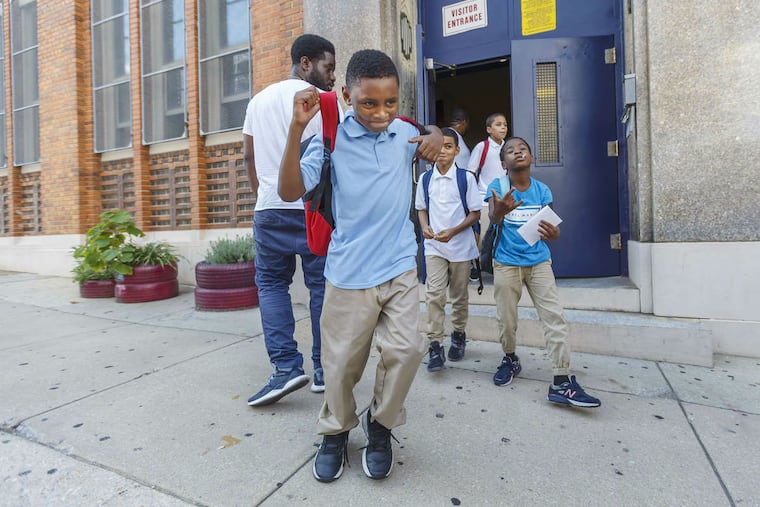Philly schools to close early Wednesday; officials decry ‘dangerous’ conditions inside schools
"With the health and safety of our children and educators at stake, it's unacceptable that the district hasn't taken any action or made any announcements about their plans for dealing with this heat wave," teachers' union president Jerry Jordan said in a statement.

With temperatures in the 90s and the heat index over 100, Philadelphia students and teachers are boiling over building conditions inside 200-plus public schools.
Schools will dismiss at noon Wednesday, officials said, but there was no relief on Tuesday, when the high was in the mid-90s and many classrooms felt hotter. Most Philadelphia School District buildings are old and do not have air-conditioning.
"With the health and safety of our children and educators at stake, it's unacceptable that the district hasn't taken any action or made any announcements about their plans for dealing with this heat wave," Philadelphia Federation of Teachers president Jerry Jordan said in a statement.
At a news conference with Jordan at Dunbar Elementary in North Philadelphia — which was erected in 1931 and has only window air-conditioning units in select classrooms — City Councilwoman Helen Gym called on the state and Peco to come up with a plan to cool city schools.
"It is inhumane for children to attend school in buildings where there is no relief from the heat," she said.
Gym said her office calculated that it would cost about $4 million to purchase air-conditioning units for all district classrooms, but that the real cost would be much higher, since many buildings' electrical systems are too old to support the units.
(Jordan said teachers at Richmond Elementary School told him last week that they all had air conditioners, but that not all could be used at the same time because of electrical problems.)
Robin Cooper, president of the principals' union, said her members are frustrated at the lack of guidance: Should they send students out for recess? Should students whose parents keep them home because of health concerns be marked absent?
Cooper, who joined Jordan and Gym outside Dunbar, said holding a full day of school was "a poor call."
"Our schools are not built for this heat," said Cooper. "This is dangerous. We can't plan, and we're getting no guidance."
Shawn Bird, the district's chief schools officer, said that because the weekend was slightly cooler than last week, officials made the call to bring students back for a full day Tuesday. Once the day begins, it's tough to call an early dismissal, because parents must scramble for care. (During snowy weather, businesses often close too, Bird pointed out; but they have air-conditioning and rarely close in hot weather.)
He said the district had distributed fans and extra water to schools that requested them.
"We agree with the PFT that we want our kids to be comfortable, and our employees to be comfortable, but it's unfortunate that we can't control the weather," said Bird.
Gym, Jordan, and Cooper said the district should not be making day-to-day calls based on temperature. A longer-term fix is needed, they said.
Philadelphia schools have historically welcomed students back to class the day after Labor Day, but for the first time school started this year in August. Officials said late August heat was about equal to the mid-June heat that they would avoid by starting the year earlier.
Even if the temperatures were similar, urban buildings without air-conditioning are going to be hotter in August than they would be in June, said Simi Hoque, a Drexel University associate professor who is a building energy-efficiency expert.
Summer heat has a cumulative effect in buildings, and would peak in August, she said, and the buildings would be all the more affected by the "urban heat island" effect. Structures and paved surfaces absorb heat during the day and are slow to release it at night, when temperatures in the city can be several degrees higher than they are in surrounding suburbs.
"The school has been absorbing heat over the summer," she said, "and it has to find a way to flush it out. It doesn't happen that easily at night."
Philadelphia schools dismissed early two days last week because of the heat. On one day, 12 students at one high school fell ill because of the heat, and one staffer had to be removed by ambulance. Jordan said more students and teachers were sickened by the heat Tuesday, but Bird said he had not heard such reports.
Bird said the district had provided guidance to principals on handling heat-related problems. Students on higher floors, for instance, could have been moved to cooler parts of the building.
He also said a calendar committee would be formed soon to consider when school should start and finish next year.
Outside Dunbar, Bruce Harris, a special education teacher, said that he did his best in brutal conditions.
"It was extremely humid inside the school — oppressive," said Harris. "Our kids were stuck here in a situation that wasn't in their best interest."
At J.H. Brown Elementary in the Northeast, veteran teacher Janet Gilmer called the mayor's office and the city health department for answers: Why was it OK that her first graders were sweltering in 94-degree heat all day?
"If I had 28 dogs in these same hot conditions," Gilmer said, "I'd be arrested, and rightly so."
Staff writer Anthony R. Wood contributed to this article.